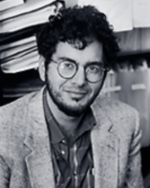Dr. David Gelernter
Dr. David Gelernter is professor of computer science at Yale, contributing editor at the Weekly Standard and member of the National Council of the Arts. He’s the author of several books and many technical articles; also essays, art criticism and fiction.
The “tuple spaces” introduced in Carriero and Gelernter’s Linda system (1983) are the basis of many computer-communication and distributed programming systems worldwide. Mirror Worlds (1991) “foresaw” the World Wide Web (Reuters, 3/20/01) and was “one of the inspirations for Java”; the “lifestreams” system (first implemented by Eric Freeman at Yale) is the basis for Mirror Worlds Technologies’ software. “Breaking out of the box” (NY Times magazine, ‘97) forecast and described the advent of less-ugly computers (Apple’s iMac arrived in ‘98). His essays are widely anthologized (for example in J. Brockman, ed., The Next Fifty Years: new essays from 25 of the world’s leading scientists (Vintage, 2002), R. Stolley, ed., Life Magazine – Century of Change, (Little Brown, 2001), and the ACM’s 50th Anniversary collection).
He’s the author of The Muse in the Machine (1994, about poetry and AI), the novel 1939 (1995), Machine Beauty (1998, about aesthetics and technology) and other books; he’s published in Commentary, ArtNews, Washington Post and many others. Recent talks include the Bradley Lecture at the American Enterprise Institute, keynotes at Agenda 2003, Intl. Wireless World, PC Expo, and the 2002 Organick Lecture in Computer Science at Univ Utah.
David is also the author of Americanism: The Fourth Great Western Religion, Drawing Life: Surviving the Unabomber, and The Aesthetics of Computing, coauthored Programming Linguistics, and coedited Advances in Languages and Compilers for Parallel Processing and Languages and Compilers for Parallel Computing: Fourth International Workshop, Santa Clara, California, Usa, August 7–9M 1991, Proceedings.
David earned his B.A. at Yale University in 1976 and his Ph.D. at The State University of New York at Stony Brook in 1982. His research interests include information management, parallel programming, software ensembles and artificial intelligence.
